|
|
|
Sort Order |
|
|
|
Items / Page
|
|
|
|
|
|
|
| Srl | Item |
| 1 |
ID:
108107
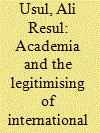

|
|
|
|
|
| Publication |
2011.
|
| Summary/Abstract |
This article aims to highlight the connection between academic studies and international politics and to provide an academic justification of foreign policies with particular reference to the case of democratisation studies. It embodies a two-way relationship. On the one hand, the conjunctures of international politics influence the nature of academic studies in the discipline of Political Science; on the other hand, academic studies may sometimes be employed as sources of legitimisation of the foreign policies of states. The article discusses these connections, providing particular examples of academic studies of the democratisation process during the Cold War and the post-cold war era.
|
|
|
|
|
|
|
|
|
|
|
|
|
|
|
|
| 2 |
ID:
108100
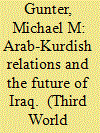

|
|
|
|
|
| Publication |
2011.
|
| Summary/Abstract |
The Iraqi Kurds now not only possess their most powerful regional government since the creation of Iraq following World War I (the Kurdistan Regional Government-krg), but also play a prominent role in the Iraqi government in Baghdad, holding the posts of president, foreign minister and several other cabinet positions. After a great deal of wrangling, the Kurds managed to maintain their strong position in al-Maliki's new Baghdad government finally cobbled together in December 2010. This dual governmental role stood in marked contrast to the situation that existed before the events of 1991 and 2003, when the Kurds were treated as second class citizens and worse. The ultimate question is for how long this unique Kurdish position of strength will last. Many Arabs still resent the Kurdish claims to autonomy as a challenge to the Arab patrimony and see a federal state for the Iraqi Kurds within Iraq as simply a prelude to secession forced upon the Arabs at a moment of temporary weakness following the war in 2003. When will the Iraqi Arabs organise themselves and start trying to reduce the power of the Kurds again? This paper will analyse this developing situation and tentatively conclude that the two sides are most likely to continue to coexist in a troublesome but peaceful relationship.
|
|
|
|
|
|
|
|
|
|
|
|
|
|
|
|
| 3 |
ID:
108096
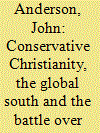

|
|
|
|
|
| Publication |
2011.
|
| Summary/Abstract |
This article explores conservative Christian contributions to debates over sexual orientation, focusing in particular on the way in which Northern Christians struggling to win their battles at home look to the global South for allies and support. This is made easier by the fact that global Christianity is once more overwhelmingly a Southern religion that generally adheres to traditionalist understandings in the sphere of sexual relations. The article looks at how this has played out at church, state and international levels by examining the conflicts over sexuality within the Anglican Communion, the domestic and international debates about the controversial Ugandan draft law on homosexuality, and discussions about sexual orientation in UN institutions. It concludes by rejecting simplistic suggestions that these are part of a one-way process, in which Northern conservatives use their counterparts in the global South to promote their own agendas.
|
|
|
|
|
|
|
|
|
|
|
|
|
|
|
|
| 4 |
ID:
108105
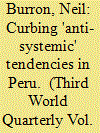

|
|
|
|
|
| Publication |
2011.
|
| Summary/Abstract |
Critical scholars and investigative journalists have developed a significant body of evidence demonstrating how US democracy assistance programmes undermine left and centre-left governments in Latin America. This article draws upon original research to examine how democracy promotion has sought to stabilise neoliberal polyarchy in Peru, a longtime regional ally of the US. It contributes to a neo-Gramsican theorisation of democracy programmes by examining how 'soft' tactics have contributed to the state's efforts at creating an inclusive neoliberal social order, a project which has ultimately failed. Particular attention is paid to the way in which US programmes were configured and carried out to respond to the rise of the 'anti-systemic' Peruvian nationalist party of Ollanta Humala, who won the recent presidential elections in June 2011.
|
|
|
|
|
|
|
|
|
|
|
|
|
|
|
|
| 5 |
ID:
108088
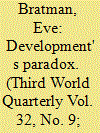

|
|
|
|
|
| Publication |
2011.
|
| Summary/Abstract |
This article examines an urban centre in the heart of the First World through a critical development lens. It contends that traits of the Third World entail certain characteristics which remain consequential as axes of analysis for a variety of economic, political and geographic settings, including new applications in contexts that are typically excluded from the focus of international development practice and scholarship. The article discusses characteristics of 'third worldality' in relation to Washington DC. It posits that, despite being emblematic as a power centre, the city exhibits many of the characteristics of a Third World city. Highlighting disenfranchisement, socioeconomic inequality, and environmental health issues, the article reveals a paradox: underdevelopment in the heart of the 'developed' world. The article calls for greater recognition of the paradoxes of development theory and practice so as to confront persistent problems of orientalism and lack of self-reflexivity in the field of international development.
|
|
|
|
|
|
|
|
|
|
|
|
|
|
|
|
| 6 |
ID:
108094
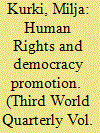

|
|
|
|
|
| Publication |
2011.
|
| Summary/Abstract |
This contribution seeks to engender more nuanced reflection on the role of human rights advocacy and specifically its role in democracy promotion. The two agendas have been seen as conjoined and harmonious by most aid donors; yet, interestingly and perceptively, some commentators have recently criticised the notion that they are agendas that are straightforwardly compatible or coherent. I examine here from a theoretical perspective the plausibility and the consequences of the claim that the two agendas share a more complex and controversial relationship than is often assumed. Specifically, I seek to highlight the importance of paying attention to the possibility that rights themselves are inherently 'contradictory' in nature and that therein lies their contribution to the democratisation agenda. Indeed, by drawing on Samuel Bowles's and Herbert Gintis's view of rights claims as 'clashing' and 'politico-economically' grounded, the aim of this article is to argue for a more politicised and openly contradiction-accepting approach to rights and democracy promotion. I contextualise this (theoretically motivated but practically consequential) argument in the context of the EU's human rights and democracy promotion policies.
|
|
|
|
|
|
|
|
|
|
|
|
|
|
|
|
| 7 |
ID:
108106
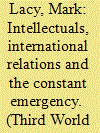

|
|
|
|
|
| Publication |
2011.
|
| Summary/Abstract |
In this essay, I return to Hans Morgenthau's and Hannah Arendt's writings on the Vietnam war and US foreign policy, which explored questions of bureaucracy, technology, emergency. On one level the essays they wrote illustrate the extent to which the discipline of International Relations (IR) has now caught up with the analyses of politics and war that they were developing in the 1960s and 1970s. We begin to see how lines of thought in Morgenthau's writing connect directly with the work of a younger generation of scholars interested in the work of intellectuals like Giorgio Agamben on the dangers of a security-obsessed politics in a 'state of emergency' or 'state of exception', or how Arendt's and Morgenthau's work on bureaucracy and war is explored in contemporary work; from a pedagogical perspective, drawing out these connections creates the possibility of a different, potentially more subversive, way of introducing students to the discipline of ir.
|
|
|
|
|
|
|
|
|
|
|
|
|
|
|
|
| 8 |
ID:
108098
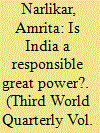

|
|
|
|
|
| Publication |
2011.
|
| Summary/Abstract |
To what extent does rising responsibility accompany rising power in international relations? This article focuses on India to address the question: is a responsible great power in the making? Following a brief theoretical discussion on the notion of responsibility and its relationship to rising power, the article offers an empirical overview of India's achievements thus far, and also the international and domestic challenges that it faces today. It argues that despite the attempts by observers to thrust greatness upon India, the country is yet to achieve greatness. The article further illustrates that India's record of assuming global responsibility has been lacklustre at best. A central argument of the article is that India's reluctance to share the burden of providing global public goods is inseparably bound with the nature of its rise to power.
|
|
|
|
|
|
|
|
|
|
|
|
|
|
|
|
| 9 |
ID:
108091
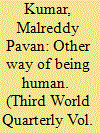

|
|
|
|
|
| Publication |
2011.
|
| Summary/Abstract |
This essay articulates the ways in which the Indigenous People's Movement leading to the United Nations Declaration on the Rights of the Indigenous Peoples (2007) succeeds in what postcolonial theory has conventionally set out to emancipate, but has failed to do. Postcolonial theory challenges all eurocentric and liberal humanist discourses on rights which place the Western subject as the ideal subject figure of all histories and societies, and appeals for a language that would articulate other ways of being human and humanist. Yet recent trends in postcolonial theory have come to embrace the language of cosmopolitanism and humanism as viable alternatives for a postcolonial future. Drawing upon the principle thematic of the UN Declaration on the Rights of the Indigenous Peoples, the article suggests that the Declaration provides an alternative to postcolonial theory's revisionist humanism-the re-cognition of difference. As part of the international legal discourse, the Declaration is particularly noted for its political victory in the legitimisation of collective rights in postcolonial societies. Furthermore, as the Universal Declaration of Human Rights (1948) remains an integral part of the collective rights of the Indigenous Peoples, the article suggests that the Indigenous People's Movement succeeds in negotiating a language that would legitimise other ways of being human without being adversarial or antithetical to euro-humanism.
|
|
|
|
|
|
|
|
|
|
|
|
|
|
|
|
| 10 |
ID:
108103
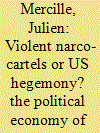

|
|
|
|
|
| Publication |
2011.
|
| Summary/Abstract |
Mainstream analysis and commentary on drug trafficking and related violence in Mexico focuses overwhelmingly on the narco-cartels as sources of the problem and presents the US as a well intentioned player helping to conduct a 'war on drugs' out of concern for addiction, crime and violence. This article offers an alternative interpretation, grounded in critical political economy, showing that in addition to fuelling the narcotics industry in Mexico thanks to its large drug consumption and loose firearms regulations, the US shares much responsibility for its expansion thanks to its record of support for some of the main players in the drugs trade, such as the Mexican government and military, and by implementing neoliberal reforms that have increased the size of the narcotics industry. The war on drugs has served as a pretext to intervene in Mexican affairs and to protect US hegemonic projects such as nafta, rather than as a genuine attack on drug problems. In particular, the drugs war has been used repeatedly to repress dissent and popular opposition to neoliberal policies in Mexico. Finally, US banks have increased their profits by laundering drug money from Mexico and elsewhere; the failure to implement tighter regulations testifies to the power of the financial community in the US.
|
|
|
|
|
|
|
|
|
|
|
|
|
|
|
|
|
|
|
|
|